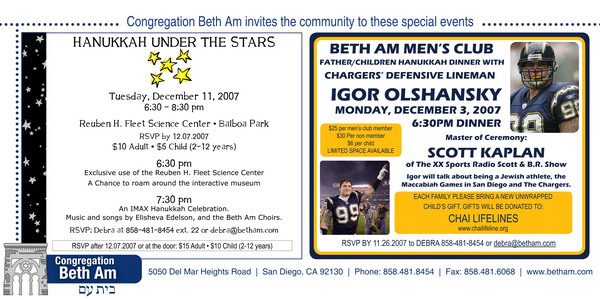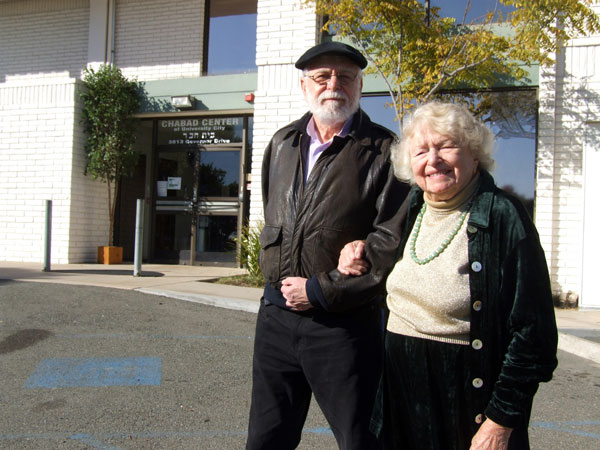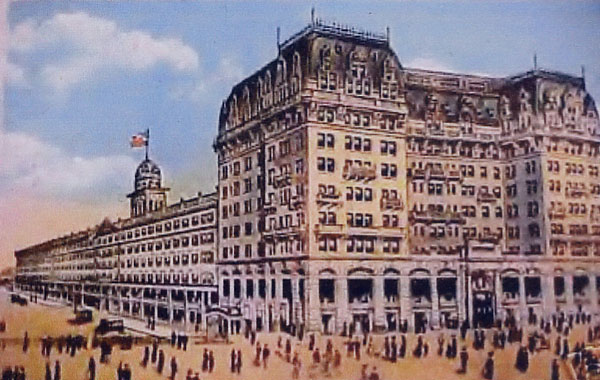| |
|



Laura Simon, 102, strolls with her son, Mayo, 79, by the Chabad at University City
THE JEWISH CITIZEN
102-year-old ponders humanity's future
By Donald H. Harrison
 SAN DIEGO—It is Laura Simon's 102nd birthday today and she is worrying about the future. Not hers, the world's. She says if we aren't careful, people may have to grow fins. SAN DIEGO—It is Laura Simon's 102nd birthday today and she is worrying about the future. Not hers, the world's. She says if we aren't careful, people may have to grow fins.
With wars in the Middle East and constant talk about nuclear confrontations, "the world is in a very serious, precarious position," she asserted during a weekend interview.
"Where are we going to go, if they throw a nuclear bomb?" she demanded. "If they do that, we are going to have to jump into the water and if we do, we are going to change into a different animal... You will have to grow fins or you are not going to be able to live down there, and you will have different kinds of eyes."
Or perhaps, she speculated over a cup of hot chocolate at her senior residence facility, people will escape by traveling into space. "But who is going to go into that spacecraft first? Are you going to take the children first?"
"I have great fears, yet ... I am optimistic, very optimistic. We can stop behaving as we do so that, as (author) D.H. Lawrence says, we don't have to change into a different animal."
A sip of hot chocolate, and she continued. "Maybe we are in the midst of changing into a different animal right now, and maybe we don't know it. I am 102, so why do I care? 'Let them knock their heads against the wall, why should I care?' I care because Mayo (her 79-year-old playwright son) is here, and I want him to have a long happy life, and Mayo has beautiful children and grandchildren, and if they are hurt, he is going to hurt. We are a family-- I don't want them to hurt."
All this talk about people changing into other animals and of intergalactic space travel, one might get the impression that Simon is a lover of science fiction. However, she suggests that if people were asked at the time she was born (in 1905, when Theodore Roosevelt was President of the United States) about all the developments that would come during her lifetime— airplanes, computers, internet communications—people would have thought that too was science fiction.
Today, she said, "you can hold a digital instrument in your hand and have digital music play for 30 hours, and the people in the library can scan books with a digital scanner... we are so advanced, and when you think ahead what it will be like in the next 100 years, it will be so profound, you just can't imagine if science keeps working like this."
At her advanced age, Simon says her ambitions for herself are simple. She wants to be able to "stand on my feet and take care of myself and still have my mind — that is my main goal. I want to think for myself. The minute you have other people think for you, you might as well dig a hole in the ground and bury yourself. You can't let others think for you. You have to think for yourself and do what you think is right."
But for the world, her hopes are far more complex. She wants people to respect each other, to care for each other, and to be more spiritual so that the world will be able to live in peace. When she published her memoirs, I Am Still Here two years ago, she said, she wanted to inspire fellow seniors to realize that their opinions still count, that their actions, their advice—and their votes—still can affect the world positively.
Who does she want to vote for in the presidential election? Al Gore, she responds without hesitation. "There's no one else."
Although she likes to attend Chabad services, she says that she does not conceptualize God in the way that He is presented in the Torah. For her, that God is a man-made concept. But everyday, she said, she senses "a power up there, an energy, that is still untapped, and I try to hang onto that power. You can call it 'God' if you want to, I don't know what it is, but it is a certain power, a certain energy that I hang onto. I feel that maybe as the years ago on, if the world is still here, that science will find that energy.
"That power is something that you feel—it is not something that you can advertise in a newspaper and say there is an energy in the world and you can grab onto it. It is so deep down and within yourself, you have to be that kind of a person that you can feel it and you can see it. What I am saying could be ridiculous to some people but to me it is very strong. Because if I didn't have that kind of feeling—that feeling if you want to call it 'spirituality'—I think I would just be someone who is eating or going to sleep at night. What is a human being? What is a human being?"
As we allowed ourselves to enjoy our hot drinks, Simon began to talk about the lack of respect in the world. She is a Democrat, she says, yet she was flattered and pleased to receive a card from the White House bearing the signatures of George and Laura Bush congratulating her on her 102nd birthday, and complementing members of her generation for contributing to the strength of the United States.
Yes, she said, George Bush has made political mistakes, but she feels compassion for him. The wars in the Middle East have not been successful; they have cost many lives, yet "how can you not take into consideration that he is a person too and he is suffering and hurts?" Simon said. "Unless you think that he is so cruel and that he doesn't care, but I can't think that way about anybody.... I hold him in high esteem even though I know he has made a lot of mistakes and people have suffered by it."
A card from the White House, special mention by Rabbi Leider during Shabbat services, numerous other honors, including one from the Braille Institute in recognition of the fact that she was able to write her book notwithstanding vision so poor she is classified as legally blind—what does Laura Simon think of all the plaudits she is receiving?
"I get a kick out of it," she responded. "When I get them, I am very thrilled, but I don't know why they are doing this. I mean, what did I do? I lived to 102. .. There are so many beautiful things going on the in the world—scientists, doctors, and what have I done?"


HONORABLE MENSCHEN IN SPORTS
If Appel's involved, baseball history is safe
By Joe Naiman
LAKESIDE, CALIFORNIA—Several board members of the Israel Baseball League submitted
their resignations from the board earlier this month, including publicist Marty Appel. Those who resigned expressed concern over the operations but wished the league well. I think I can make a safe bet that Appel will make sure that the IBL's history will be preserved.
I first encountered the name - and a brief background -of Marty Appel in an issue of Diamond Magazine about 1993 or 1994 when that publication was being mailed free of charge to Society for American Baseball Research members.
Marty had, I learned, been involved with publicity for the New York Yankees in the 1970s, including during the 1973 season when the team abandoned Yankee Stadium for two years while the ballpark was being remodeled.
The history of the New York Yankees includes 26 World Series championships and 39 American League pennants. Other than the remodeling seasons of 1974 and 1975, the Yankees have played in Yankee Stadium since 1923. The team used several other stadiums for home games since moving
from Baltimore two years after the American League commenced play, and before being called the Yankees the team was known as the New York Highlanders. The franchise was also the Baltimore Orioles in 1901 and 1902 before moving to New York for the 1903 season.
In 1973 Marty Appel came across a Mosler safe which had stencils denoting names of 1903 Yankees players. He concluded that the safe was the only remaining item from the 1903 team and had made the move to the various subsequent ballparks. Marty made it his personal mission to oversee the safe's move to the Yankees' temporary headquarters.
Unfortunately, a couple of days before the date of the actual relocation, the safe disappeared while Marty was gone. He asked the movers about the safe, which should have been a conspicuous item as well as a heavy one which likely couldn't have been moved by a single individual, but none of the workers knew about the safe.
A year or so after I read Marty's article about the safe (I think the article was actually about the team, but the loss of the safe is what I remember about it), I was conducting some research and found conflicting information. Since Marty was the source of one of the irreconcilable items, I wrote him to advance my knowledge of the matter. I also asked him if the safe was ever found.
Marty provided a response, which I have somewhere in my files, to my research query. He noted that the safe hadn't been located.
I don't know if that safe has ever been found, but if it's any consolation a similar loss of history is something Marty surely won't let happen this time. He was involved in the first year of the Israeli Baseball League, and I'm sure he'll make every effort to preserve relics of the league's first season. He'll have no control over what happens 70 years from now, but he'll likely be taking steps to
see that as much Israeli Baseball League history as possible is preserved.
What Marty has recorded for history during the first Israel Baseball League season, and that which has been distributed and will become historical Israel Baseball League items several decades in the future, must not suffer the fate of the Mosler safe. Marty did his part of the job, creating aspects of Israel Baseball League history. It is up to us and our descendants to preserve that history. Perhaps someday an item Marty provided during the 2007 season will end up as a historical item
the way Marty thought of the Mosler safe - and this time perhaps it can be preserved.


The Breakers Hotel in Atlantic City, N.J.
JEWISH MEMORIES
The Bella family circle goes from the coast to The Breakers on the shore to the beach
SAN DIEGO— I love the idea of being able to get in my car here and end up at the beach within twenty minutes. But when I think about it, convenience isn’t everything….
People on the West Coast go “to the beach” but on the East Coast we went “to the shore.” We didn’t go to the beach until after we got to the shore. In addition to the monthly meetings (dues $1.00 per month per adult), the annual Passover Seder and the Annual Picnic at the lake, the Bella Family Circle made an annual trip to the shore. The BFC was made up of approximately 75 people who were descended from – or married to descendants – of Great Grandmother Bella.
We left early in the morning, spent the day and returned late at night. The World Famous BFC Organizing Committee decided that a room in a hotel could be shared by two family units to change from street clothes, to bathing suits, to fancy dress for supper and back to street clothes. What they didn’t have to decide was which hotel would be chosen or where the fancy supper would be eaten. There was only one choice: The World Famous Breakers Hotel of Atlantic City, New Jersey - the snobbiest hotel in the city.
We arrived at Uncle Wally’s house early on Sunday morning and when, as family patriarch, he was satisfied that everyone who should be there was there, on to the bus we trooped and with grinding gears off we went. Normally we would have filled two buses but those with small children opted not to go. As a young teen, I envied those who didn’t go.
The trip from Philadelphia to Atlantic City was about sixty miles and took two hours in those days of 35 MPH speed limits. After an impassioned discussion of whether to use the White Horse Pike or the Black Horse Pike, everyone settled down to enjoy the trip. I never understood the de/merits of either road as both started from the same place and got us to the same destination in the same amount of time.
The bus had bench style seats holding two people – two on the left side of the bus and two on the right. Since my mother and father sat together, I was the “odd person” and so had to share a bench seat with someone else. Because I was skinny, I got to sit next to Uncle Moishe who was traveling as a “single” but was the size of two people in one skin. With him sitting next to me, I spent most of the trip trying not to slide down the incline his weight created.
This proved disastrous. At a “rest stop” we purchased cold drinks and I brought my cup of soda with lots of ice back onto the bus. Going over a bump and straight into a pot hole, my hand was jarred and two chunks of ice landed in the groove between Uncle Moishe’s ample derriére and the bus seat. Faced with the choice of trying to dig the ice out with my fingers or explaining to him what had happened, I elected to do neither and instead joined some of my cousins in the back of the bus until I was sure the ice had melted. No one mentioned the wet spot on Uncle Moishe’s pants, and I don’t think he felt it through those ample layers of flesh. I made sure I didn’t look in his direction.
The huge Breakers Hotel opened directly onto the World Famous Atlantic City Boardwalk. The hotel built in the early 1920’s had at one time been the most elegant in the city and to enhance that elegance restricted Jews from its premises. But Jews eventually had their revenge and now filled it year after year. However, the hotel had the ultimate revenge: its glory days now existed only in the minds of the elderly Jews who had once been forbidden to enter its doors. For youngsters like me, who had no memory of either the restriction or the glory, I saw it for the painted lady (dump) it had become.
As we entered, instead of being overwhelmed by the grandeur, I was overwhelmed by The Smell. I didn’t know what it was but the closer one got to the dining room and therefore the kitchen, the worse it became. It seemed to be a combination of lox, sardines, gefilte fish, chopped liver, horse radish, burnt chicken feathers and schmaltz all enhanced with dust, rust and dank.
My mother, tired of listening to my complaints, suggested that I go into the “Writing Lounge” and wait there while they went through the commotion of registering. The “Writing Lounge” had such a sophisticated ring to it, however, when I entered all I saw was a brown fog through which I could barely make out rows of leather chairs each with a newspaper - The Forvards (in Yiddish) - being held by two hands and a pair of legs coming out from underneath – in chair after chair after chair. And now added to The Smell was the chimneys of dozens of cigars. I fled.
Registration completed, we changed in our rooms and went to the beach. The warm Atlantic Ocean was a balm for my body, my soul and my nose. As a 14-year-old I was a walking appetite and fortunately the hot dogs sold at the lunch counters along the Boardwalk were kosher and without hesitation I downed three. I should have had more – enough to carry me past supper.
While the highlight of the trip for me was the beach and ocean, the highlight for the adults was supper in the Grand Dining Room of the World Famous Breakers Hotel of Atlantic City. My problem was the restaurant was that much closer to the kitchen which was obviously the source of The Smell. However, now in addition to The Smell was The Sight: chicken with pimply yellow skin still attached to slimy flesh floating in yellow goo. Not even the perpetual hunger of a young teen could overcome my revulsion. While the adults were happily - obliviously - digging in, most of my life was still before me and I wanted to live to enjoy it.
Looking at the menu was no help – everything seemed to begin and end with chicken with pimply yellow skin attached. Then I spied down in the corner “side dishes – baked potato.” How could they possibly mess up a baked potato? So, that’s what I ordered: one baked potato. It was brought to me in a soup bowl. I was saved. That’s all I ate. I didn’t trust the applesauce (listed as a salad) or the jello (listed as a dessert). I didn’t even drink the water when the waiter refused to supply me with a straw. No way was I going to put my tender young lips on a glass that came out of a kitchen with The Smell.
The waiters were all Jewish male college students, refugees from the city (Philadelphia, mostly) working for the summer. Even though they had name tags affixed to their once white jackets, they all answered to the same name: “Boy-chik.” It saved a lot of trouble trying to remember names – everyone called them “boy-chik” and they answered. I didn’t call them anything – I was too busy making sure the baked potato hadn’t been tainted. In the middle of the Grand Supper, with the excuse of having to go to the Ladies Room, I ran outside for some relief from The Smell.
Supper over, we walked for miles along the Boardwalk – the adults wanted to walk off the effects (grease) of the meal, while I really wanted another kosher hot dog or two. Instead I settled for a sandwich made out of hot waffles and vanilla ice cream. It was nip and tuck to see if the ice cream would melt faster than I could eat it. To this day, I’ve never been able to find a hot waffle and vanilla ice cream that tasted better.
After the early morning bus trip, a long afternoon of throwing our bodies through the waves (except for the Aunts who didn’t dare move around too much in their nipped and tucked bathing suits), The Grand Supper, and walking for miles on the boardwalk, we trooped wearily onto the bus for the night ride home. Everyone settled down and several began to snore. But it was not to be. My Grandfathersimply couldn’t end the day with a snore – he wanted it to end with a song. And sing we did.
Bei Mir Bist du Schein (to me you are pretty) was soon parodied into “Du hast groiser tzein” (You have big teeth). Then You Made Me Love You – I didn’t wanna do it soon became “You Made Me Love You – I was right not to do it.” But Because of You was my Grandfather’s favorite song – so we sang it straight – or else. We didn’t sing Open the Door Richard because my little 3-year-old cousin, Richard, wasn’t on the bus so there was no fun laughing while the poor kid ran to the door. It was hard to resist singing it when he was around – he probably ended up with some sort of complex about doors.
Finally, even Grandfather had to admit it had been a long day and everyone was tired. So he and three Uncles went to the back of the bus to play as many pinochle games as they possibly could in the time left. They played by flash light. Now, an Organizing Committee that thinks to bring flash lights for a pinochle game on a dark bus is truly an Organizing Committee of which to be proud.
(The hotel was torn down in the 1970’s - I assume The Smell went, too.)
SUNDAY, NOVEMBER 25
Donald H. Harrison in San Diego: A call for reinvigorating Thanksgiving
Rabbi Baruch Lederman in San Diego: This worker put his trust in his boss
Max Schindler in San Diego: The Chain, a story from the Shoah
FRIDAY-SATURDAY, NOVEMBER 23-24
Natasha Josefowitz, PhD in La Jolla, California: Why I chose a retirement community
Dov Burt Levy in Salem, Massachusetts: ADL actions in Armenian controversy suggest leadership delusions of grandeur
Lynne Thrope in San Diego: Jewish community turned out en masse for San Diego Bay Wine and Food Festivalwish community turned out en masse for San Diego Bay WLarry Zeiger in San Diego: Gay love bubbles among Mideast rivals
THURSDAY, NOVEMBER 22
Shoshana Bryen in Washington, D.C.: Rice should be in Baghdad, not Annapolis
Rabbi Wayne Dosick in Carlsbad, California: 'Who by fire'—when the words of our liturgy crackle beyond our doorsteps
Donald H. Harrison in San Diego: Appreciating all our Rembrandts
WEDNESDAY, NOVEMBER 21
Garry Fabian in Melbourne, Australia: * Orthodox dispute poll indicating most New South Wales Jews favor gay unions ... * Victorian Premier praises Jewish volunteerism ... *ZFA funding safe—at least for now ... * Journalists must make truth again the priority, Carl Bernstein tells Australian Jewish National Fund
Donald H. Harrison in San Diego: Eve was superior to Adam, biblical scholar Shalom Paul asserts
Judith Apter Klinghoffer in Cherry Hill, New Jersey: Now let us give thanks for Judith, a Jewish female prototype found in the Apocrypha
Ira Sharkansky in Jerusalem: The pros and cons of Annapolis
Isaac Yetiv in La Jolla, California: Mr. President, please cancel conference
TUESDAY, NOVEMBER 20
Donald H. Harrison in San Diego: Rabbi at interfaith service denounces tactics of Minutemen against migrants
J. Zel Lurie in Delray Beach, Florida: Calling Israel a 'Jewish state' a misnomer
Melanie Rubin in San Diego: Another Jewish license plate: 2Nudnix
Dan Schaffer in San Diego: Look! Look! Dick and Jane’s new authors
practice a vicious brand of partisan politics
Isaac Yetiv in La Jolla, California: Three reasons for saying no to the Palestinian 'right of return' demand
MONDAY, NOVEMBER 19
Peter Garas in Canberra, Australia: Jewish knowledge and information on the web: can it be indexed for researchers?
Donald H. Harrison in San Diego: TV Phenomenon personality materializes at Soille San Diego Hebrew Day fundraiser
Joe Naiman in Lakeside, California: Is Ryan Braun baseball's first Jewish rookie of the year? It depends...
Sheila Orysiek in San Diego: 'What could not sustain them but the spirit of G-D and His grace?'
< BACK TO TOP |
|

